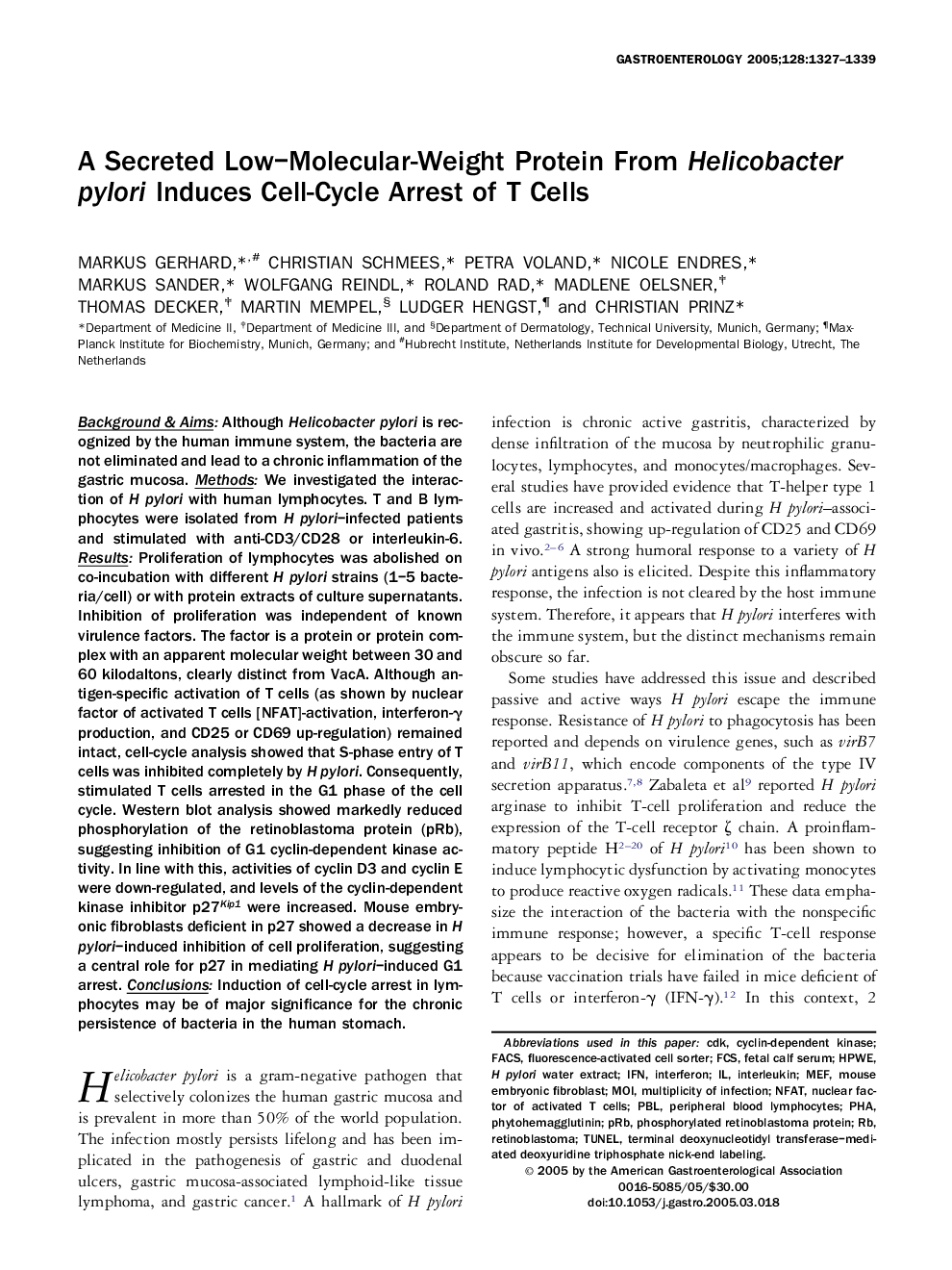| کد مقاله | کد نشریه | سال انتشار | مقاله انگلیسی | نسخه تمام متن |
|---|---|---|---|---|
| 9244304 | 1209910 | 2005 | 13 صفحه PDF | دانلود رایگان |
عنوان انگلیسی مقاله ISI
A Secreted Low--Molecular-Weight Protein From Helicobacter pylori Induces Cell-Cycle Arrest of T Cells
دانلود مقاله + سفارش ترجمه
دانلود مقاله ISI انگلیسی
رایگان برای ایرانیان
کلمات کلیدی
CDKFACSNFATPHAMEFPhytohemagglutininPBLPRBFCSMOI - MEinterferon - اینترفرونIFN - اینترفرون هاinterleukin - اینترلوکینterminal deoxynucleotidyl transferase–mediated deoxyuridine triphosphate nick-end labeling - برچسب ترمودینامیک deoxyuridine triphosphate ترمینال deoxynucleotidyl transferase ترمینالTUNEL - تونلretinoblastoma - رتینوبلاستوما، تومور شبکیهfetal calf serum - سرم گوساله جنینNuclear Factor of Activated T Cells - عامل هسته ای سلول های T فعال شدهfluorescence-activated cell sorter - فلورسانس فعال سلول مرتب سازperipheral blood lymphocytes - لنفوسیت های خون محیطیmouse embryonic fibroblast - موش فیبروبلاست جنینیmultiplicity of infection - چندین عفونتcyclin-dependent kinase - کییناز وابسته به سیکلین
موضوعات مرتبط
علوم پزشکی و سلامت
پزشکی و دندانپزشکی
بیماریهای گوارشی
پیش نمایش صفحه اول مقاله

چکیده انگلیسی
Background & aims: Although Helicobacter pylori is recognized by the human immune system, the bacteria are not eliminated and lead to a chronic inflammation of the gastric mucosa. Methods: We investigated the interaction of H pylori with human lymphocytes. T and B lymphocytes were isolated from H pylori-infected patients and stimulated with anti-CD3/CD28 or interleukin-6. Results: Proliferation of lymphocytes was abolished on co-incubation with different H pylori strains (1-5 bacteria/cell) or with protein extracts of culture supernatants. Inhibition of proliferation was independent of known virulence factors. The factor is a protein or protein complex with an apparent molecular weight between 30 and 60 kilodaltons, clearly distinct from VacA. Although antigen-specific activation of T cells (as shown by nuclear factor of activated T cells [NFAT]-activation, interferon-γ production, and CD25 or CD69 up-regulation) remained intact, cell-cycle analysis showed that S-phase entry of T cells was inhibited completely by H pylori. Consequently, stimulated T cells arrested in the G1 phase of the cell cycle. Western blot analysis showed markedly reduced phosphorylation of the retinoblastoma protein (pRb), suggesting inhibition of G1 cyclin-dependent kinase activity. In line with this, activities of cyclin D3 and cyclin E were down-regulated, and levels of the cyclin-dependent kinase inhibitor p27Kip1 were increased. Mouse embryonic fibroblasts deficient in p27 showed a decrease in H pylori-induced inhibition of cell proliferation, suggesting a central role for p27 in mediating H pylori-induced G1 arrest. Conclusions: Induction of cell-cycle arrest in lymphocytes may be of major significance for the chronic persistence of bacteria in the human stomach.
ناشر
Database: Elsevier - ScienceDirect (ساینس دایرکت)
Journal: Gastroenterology - Volume 128, Issue 5, May 2005, Pages 1327-1339
Journal: Gastroenterology - Volume 128, Issue 5, May 2005, Pages 1327-1339
نویسندگان
Markus Gerhard, Christian Schmees, Petra Voland, Nicole Endres, Markus Sander, Wolfgang Reindl, Roland Rad, Madlene Oelsner, Thomas Decker, Martin Mempel, Ludger Hengst, Christian Prinz,